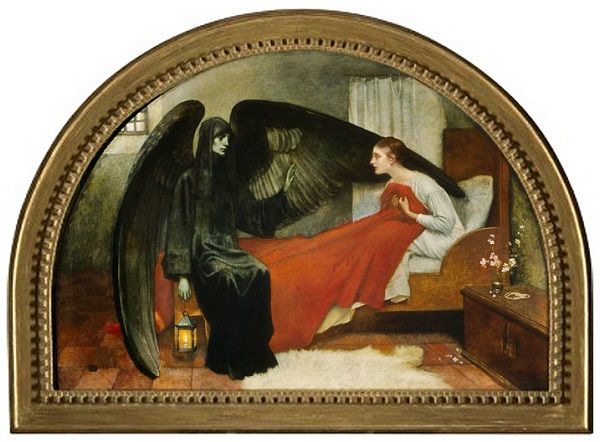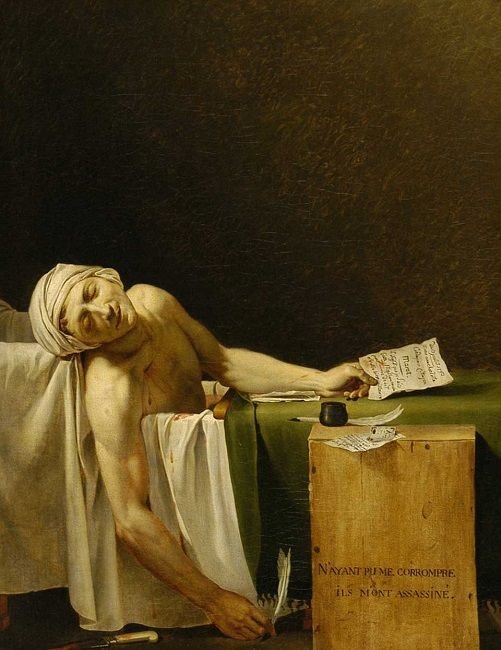Belief in life after death is a reaction to our inability to accept the death of the near man, our unwillingness to be reconciled with it. This brings a new, modern phenomenon of feelings that have a strong influence and it even manage human behavior. In romanticism, the "sense of the other" becomes dominant. The focus is on the closest ones, which are not many. For us, they are irreplaceable and unique. That's why the pain of their loss is inexpressible. A person who is starting to get hurt, not because he can die, but rather he is afraid for his relatives. Though far behind, Romanticism has contributed to the radical change of man in society. At the beginning of the twentieth century, the death of a person changed the space not only of relatives and friends, but also of the whole society. Traditional rituals are as we know them today. The visit of the deceased to his home by many people. Sending it to the grave. The death of the individual affects the entire social group and it reacts collectively, starting from close relatives and reaching a wider circle of acquaintances and subordinates.

Death has always been even a public and social fact today. In the 20th century, death is part of our everyday life. Especially in the cities, it does not disturb the time of public life. If the custom and the look on it has changed for hundreds of years, it is now only for one generation. Trauma, for example, has been worn for years, today is not even a must, but rather a black outfit. Today, in the fast-paced rhythm, a time when death is coming quickly and just as quickly disappears - death is so fast and easy to experience. People agree with it and continue their lives. After the funeral, nothing seemed to have happened. As if no one was dying. Relatives even talk about the deceased while he is still alive. People explain to children he's somewhere in the sky or he sleeps or he's gone away. But whether it is correct. Is not it better to tell the truth, however painful it is? I do not think, because the children are their children and they are not so strong and painful to experience the loss of a relative and the fact that they will never see him again. While the older and less naive fools have stopped barking that their loved one is deeply asleep and at the same time watching how he lies. In the meantime, young children, under the inconvenience of children's games, call in the absence of the deceased. The big ones are also called. In the nineteenth century a cult to the grave appeared. In the sense that people prefer the grave to cremation. The grave is the place to save memory and to visit. Conversely, cremation also has its own few. It does not mean forgetting the dead. Cremation is a denial of the thought of the slow decomposition of the corpse and the materialization of the place and its relation to the deceased near. Some even prefer to scatter the dust. But they affirm the personal and private nature of sorrow and the memory of the deceased. In some cases even cremation is obligatory, especially if death is caused by a severe virus that can infect others. In some Western countries, the worship of the cemetery is replaced with memory. A common occurrence is the storage of dust in the home or the keeping of the belongings and the room of the dead. So the great sorrow and affection for the deceased is completely compatible with the neglect of his grave, which often turns into a hateful place: there is rotting the body of the beloved being. This is how the two cases occur. The one in the quiet everyday life - the visit to the grave and the care for him and the other - the forgetfulness of the grave and the cult of the deceased's memory. The question of preparing the dying man for death was often discussed. This was previously impossible for doctors, but in fact, this is the purpose of the dying man to leave life much easier by rebuilding human dignity. The dignity of the dying is talked about that death can not be ignored and kept silent , but to be recognized as a real state and - moreover - as a fundamental act. So it seems that the old mentality about death has died, that it must definitely be talked to it rather than being silent. For, in my opinion, silence shows the uncertainty and the fear of the unknown and of those who will live. And that would not soothe the dying.

Death is not an individual act. With the ceremonies it is marked the solidarity of the individual with family, relatives, society, and even the whole world, because alive or dead man is still a part of him, by nature - alive and inanimate. According to religions, the end of life does not coincide with physical death. Human life continues its future in the higher world. The world of those who deserve their good deeds - the paradise and the world of the bad ones - hell. In Buddhism, for example, it is after death - nirvana, which means rebirth only with a purified soul. These religious miracles are intended to create reconciliation and comfort before death, but over the centuries they have acted and continue to act as moral regulators of human behavior. I think the fear of death will always be independent of the upbringing and religious beliefs and no matter how much they talk about. There is because the unknown for man is even worse than death itself, even painful. For this and during the years of war ideals and causes were its own or psychological techniques to justify death. Otherwise, man would keep his life at all costs. Today, this technique is very relevant to Islamic fundamentalism, where brainwashing is precisely what happens with the intrusion of a most common patriotic idea, a cause. In fact, to be convinced that you can defeat death by not being afraid of it gives inexpressible power, self-confidence, strength. Both fear and his absence from death are two very significant models and forms of psychological control and on individual, human behavior, both on the public and on the world's behavior. Quite naturally I believe along with life begins the path to death. "Man is born to die." Death as fate, like karma, or death as a natural necessity to maintain the circle of nature. Everyone can believe what he finds fit, as long as he or she can duly stand up to it or experience it. Both for life and death can be said infinitely and from different points of view they are barking or not, everyone chooses. But death in its nature is a necessity for the birth of life. This is my biological view of death. The ethical one expresses the eternal question of the meaning of life that I think finds itself in what man leaves behind after the end of his life, namely death.
My father died approximately one year ago. He was cremated. His cremated remains are with his girl friend at the time who wants me to remove his ashes from her life, I will do so when I return to Las Vegas for a visit late next Summer. No one talks about Dad much any more. It is at times almost as if he had never lived among us.
Downvoting a post can decrease pending rewards and make it less visible. Common reasons:
Submit
My condolences.
This is really sad. When my close person dies it is the same. I think this is the natural psychological reactions of man. Your only contact with them stays only in your dreams.
Downvoting a post can decrease pending rewards and make it less visible. Common reasons:
Submit
I only think about the good things. I thought that I might have thought about the bad things, but that is not the case at all. Thanks for your thought-provoking post.
Downvoting a post can decrease pending rewards and make it less visible. Common reasons:
Submit
You are welcome :)
Downvoting a post can decrease pending rewards and make it less visible. Common reasons:
Submit
We may not admit that but that is the reality of our frail being. @godflesh
Downvoting a post can decrease pending rewards and make it less visible. Common reasons:
Submit
Death is the last great adventure. While I do not, per say, look forward to my death I cannot say that I am afraid of it. Who knows what is beyond that final door? I don't, not yet, and until it's my time to go and find out I will attempt to enjoy the living portion of life to the best of my ability. But that's just my thoughts on the topic, feel free to please ignore.
Downvoting a post can decrease pending rewards and make it less visible. Common reasons:
Submit
My experience is that when you look at death and think about it, then you appreciate life a lot and look at it from a different angle. Death and life are connected. Thoughts of death are not a nice thing, but they can inspire you. You experience then your being in its entirety. You become then also more sympathetic and good to the others. There are positive aspects, but I fully understand the people who ignore it :)
Cheers!
Downvoting a post can decrease pending rewards and make it less visible. Common reasons:
Submit
How bizarre that I come to reply to your comment now that I just received a phone call from my mother. She was distraught. She had to have her old, fifteen year old dog put to sleep today. The ripples that a life makes can turn into waves.
Downvoting a post can decrease pending rewards and make it less visible. Common reasons:
Submit
I just have started following you. You have an interesting and creative contents. I am looking forward to your next post
Downvoting a post can decrease pending rewards and make it less visible. Common reasons:
Submit
Thank you very much :)
Downvoting a post can decrease pending rewards and make it less visible. Common reasons:
Submit
Nice work. Thanks for sharing..
Also check out my introductory post.. I'm not still too familiar with everything just yet.
https://steemit.com/introduceyourself/@formatwithapk/it-s-all-about-me
Downvoting a post can decrease pending rewards and make it less visible. Common reasons:
Submit
Sure :)
Downvoting a post can decrease pending rewards and make it less visible. Common reasons:
Submit
You got a 5.97% upvote from @postpromoter courtesy of @godflesh!
Want to promote your posts too? Check out the Steem Bot Tracker website for more info. If you would like to support the development of @postpromoter and the bot tracker please vote for @yabapmatt for witness!
Downvoting a post can decrease pending rewards and make it less visible. Common reasons:
Submit